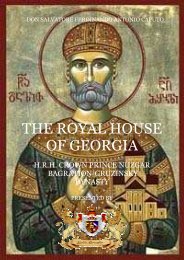here - Nobility Associations
here - Nobility Associations
here - Nobility Associations
You also want an ePaper? Increase the reach of your titles
YUMPU automatically turns print PDFs into web optimized ePapers that Google loves.
himself. This reacquisition of Jerusalem was a temporary phenomenon and it fell<br />
again about a dozen years later. The lines of communication were too long for<br />
European interests to hold in the 13th century.<br />
Frederick was intellectually curious and had scholars in his court. Among his<br />
interests, he was a coin collector. He was culturally interested in Islamic thought<br />
but was forceful in dealing with any kind of resistance from Islamic (or other)<br />
subjects. At one point he forcibly relocated 15,000 rebellious Muslims to the<br />
mainland as a way of asserting control in Sicily. He required Muslims and Jews and<br />
prostitutes to wear distinctive clothing as a way of setting them apart in Sicily. This<br />
was all happening as Europe was becoming even less tolerant of non-orthodox non-<br />
Christian thinking. He directed this hostility towards his subjects, and was himself<br />
the target of a 'crusade' for his unorthodox ideas and anti-papal actions. It was not<br />
successful. This was just after the time the Church supported another intra-<br />
European crusade, against the Albigensian <strong>here</strong>sy in southern France.<br />
He was frequently at war with the Papacy, hemmed in between Frederick's lands in<br />
northern Italy and his Kingdom of Sicily (the Regno) to the south, and thus he was<br />
excommunicated four times and often vilified in pro-papal chronicles of the time<br />
and since. Pope Gregory IX went so far as to call him the Antichrist.<br />
Speaking six languages (Latin, Sicilian, German, French, Greek<br />
and Arabic, Frederick was an avid patron of science and the<br />
arts. He played a major role in promoting literature through<br />
the Sicilian School of poetry. His Sicilian royal court in<br />
Palermo, from around 1220 to his death, saw the first use of a<br />
literary form of an Italo-Romance language, Sicilian. The<br />
poetry that emanated from the school had a significant<br />
influence on literature and on what was to become the modern<br />
Italian language. The school and its poetry were saluted by<br />
Dante and his peers and predate by at least a century the use of<br />
the Tuscan idiom as the elite literary language of Italy.<br />
Marriage of father Henry VI<br />
In 1186 is celebrated in Milan (Altar of St. Ambrose) the marriage of Henry VI, who<br />
was born in the 1165 to Nimwegen: cruel man more feared than loved, ruthless and<br />
vindictive, called "Nordic storm of terror" by Pope Innocent III, the second<br />
Emperor Frederick Barbarossa, with Constance, born in the year 1154, daughter of<br />
Roger II of Sicily and the fifth wife Beatrice, and aunt of William II the Good, who<br />
had married Joan of England, sister of Ricardo Lionheart, was the heir of the<br />
Norman Kingdom of Sicily. This marriage would in fact have meant, in near future,<br />
the union of Kingdom of Sicily with the Empire, which should have ended<br />
completely the Papal States to the work of one great universal power, to reduce The<br />
Holy See to a role of absolute nothingness.<br />
Constance, wife of Conrad VI, had been forced to renounce her vows for the<br />
marriage to the son of the Emperor. Reign on the throne of Sicily was Constance’s<br />
The Hohenstaufen Dynasty - Page 45 of 200



